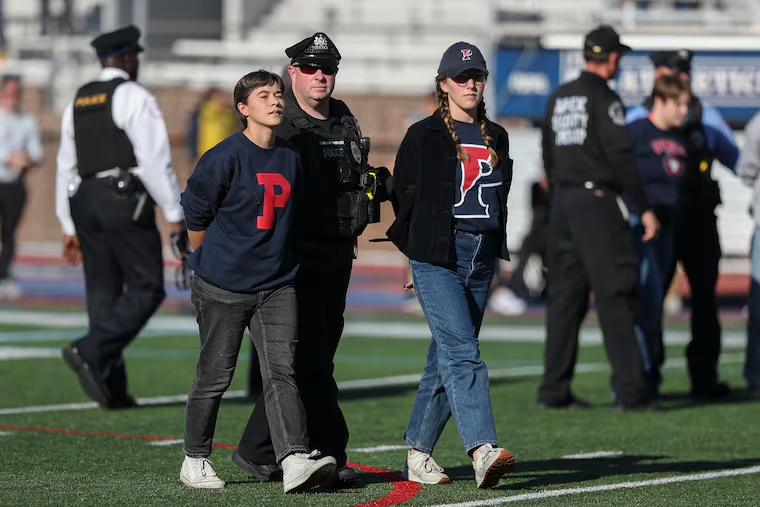Why I didn’t sign the free speech petitions at Penn
I agree that Penn has been too harsh on student protesters, which could hurt free speech on campus. But it's because I believe in free speech that I won't sign any petitions supporting the students.

Do you believe in free speech? Or do you simply want freedom for the speech that you support?
I’ve been thinking about these questions during the recent controversy at Penn over the disciplining of student protesters. Over 30 students are under investigation for interrupting the president’s convocation speech, storming the football field during halftime of the homecoming game, and camping out in tents on the College Green.
The student protesters want the university to divest from fossil-fuel investments, preserve a set of townhomes in University City, and make payments to Philadelphia in lieu of taxes. I support all of those goals. And as a professor at Penn, I’m especially troubled by the university’s heavy-handed treatment of the student protesters. At the football game, for example, 19 students were arrested; 13 were cuffed with zip ties.
It is worth noting that similar tactics were used at the Harvard-Yale football game in 2019, where the police issued 42 misdemeanor summonses for disorderly conduct. Harvard announced last fall that it would stop investing in fossil fuels. Yale has yet to follow suit.
So why didn’t I sign any of the petitions that have been circulating around campus in support of them?
Because all of the petitions that I saw endorsed the students’ political demands alongside their right to speak up for them. For instance, an open letter from faculty to support the protesters asks signers to “join with [protesters] pressing for immediate divestment from investments in fossil fuels, for payments in lieu of taxes (PILOTs), for the support of the residents of the University City Townhomes.”
Of course I want the students to be able to protest university policies without fear of harassment or penalty. But I would also support their freedom of speech if they wanted Penn to burn more oil, knock down every affordable building in West Philadelphia, and give nothing to the city.
» READ MORE: Students call on Penn to drop discipline against protesters, fully divest from fossil fuels
And that’s what makes me something of an outlier at Penn, which received the second-lowest free speech ranking among the 203 colleges and universities analyzed earlier this year by the Philadelphia-based Foundation for Individual Rights and Expression. If you believe U.S. News and World Report, Penn is the seventh-best school in the country. But when it comes to free speech, FIRE says, we’re next to last.
That’s because Penn scored poorly on several key metrics, including “Comfort Expressing Ideas,” tolerance for controversial (conservative) speakers, and sanctioning students. Surveys show that big swaths of our students don’t feel safe saying what they think. Conservatives are especially afraid, and with good reason: They’re a small minority of the student body, which puts them at the biggest risk of being canceled.
“I witnessed a student berated by others for trying to recruit conservatives,” one Penn student told the FIRE survey. “I felt if I had spoken up for them, I would be possibly yelled at, harassed, or worse assaulted.” Other students said they were afraid to admit that they were antiabortion or that they had voted for Republicans.
On the administrative side, meanwhile, FIRE took Penn to task for its efforts to sanction law professor Amy Wax. She has come under enormous attack for saying — among other controversial claims — that the United States would be “better off with fewer Asians and less Asian immigration.”
Quick question: How many people at Penn who have rallied for the free speech of student protesters also signed the many petitions seeking the dismissal of Amy Wax? I don’t know, but I’m sure there were a lot. I also don’t know how they can have it both ways.
False equivalence alert: A student demanding divestment from fossil fuels isn’t the same as a professor making racist statements. But they have — or should have — the same right to say what they think.
And if you think otherwise, please tell me who should determine the statements that are too heinous for us to hear. The petitions supporting the student protesters say that Penn administrators have used excessive tactics to threaten the students, and I agree. But if that’s how you feel, why would you also want to empower the very same administrators to censor what we can say?
Conservative students are already biting their tongues on our campus.
According to a petition signed by 73 faculty members, disciplining the protesters will lead to “a chill on free speech” at Penn. I didn’t sign this one either because, like the other petitions, it also endorsed the students’ political demands. Still, I agree with the sentiment — penalizing the students would hurt free speech on campus. But the same goes for penalizing Wax — conservative students are already biting their tongues on our campus. They’ll be even less likely to speak up if we fire Wax.
And if you don’t think that’s a problem, you don’t really believe in free speech. You just want your own speech to be free.
Jonathan Zimmerman teaches education and history at the University of Pennsylvania. He is the author of “Whose America?: Culture Wars in the Public Schools,” which was published in a revised 20th-anniversary edition this fall by the University of Chicago Press.